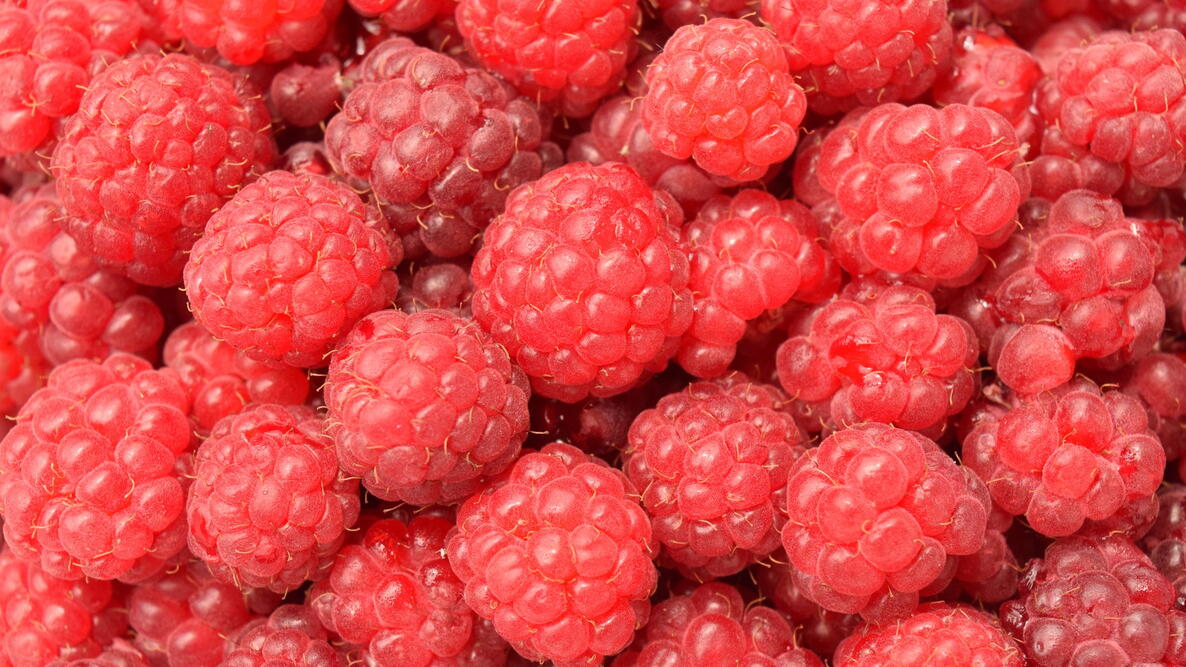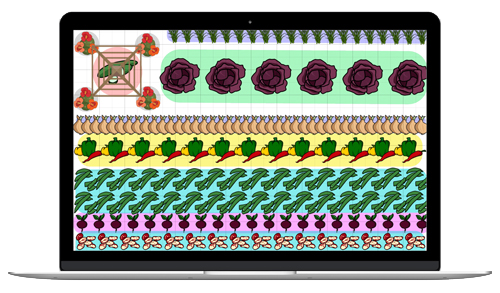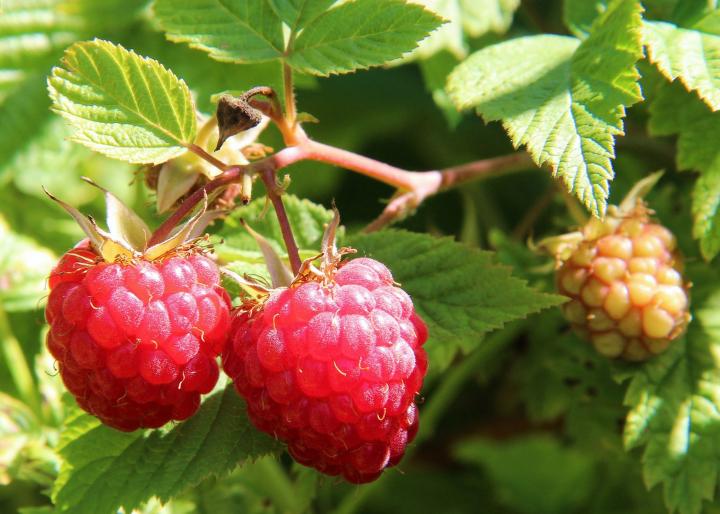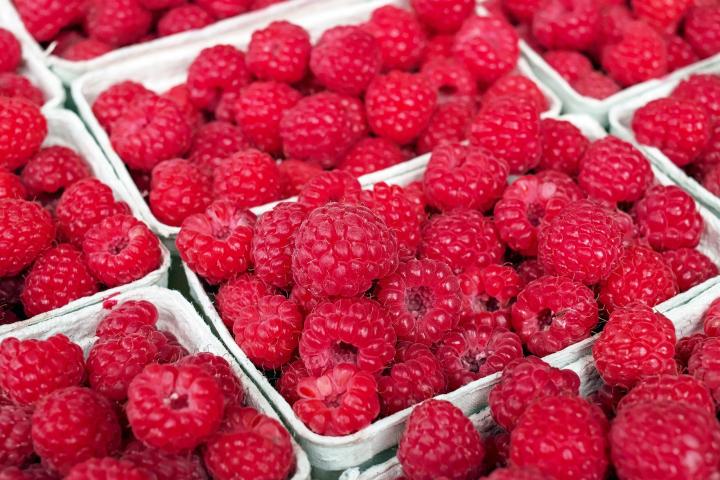
From Backyard to Berry Bowl: Your Complete Raspberry-Growing Guide
The Almanac Garden Planner - Use It Free for 7 Days!
Plan your 2025 garden with our award-winning Garden Planner.
Types
There are many, many raspberry varieties available today—and each one is unique! Ask your local garden center or cooperative extension service which raspberry varieties are best suited for your area. Here are a few to get you started:
- ‘Canby’: red berries; summer-bearing; nearly thornless; recommended for New England, Upper Great Lakes, and Northwest
- ‘Heritage’: red berries; ever-bearing; recommended for the Mid-Atlantic and Ohio Valley
- ‘Plainsman’: red berries; ever-bearing; does well in higher altitudes (the Rockies and High Plains)
- ‘Fallgold’: yellow berries; ever-bearing; recommended for the Upper Midwest and Canada
- ‘Double Gold’: yellow berries tinged with peach; ever-bearing; better for warmer areas, as the fall crop can be quite late
- ‘Royalty’: purple berries; summer-bearing; better for warmer areas
- ‘Jewel’: black berries; summer-bearing; disease-resistant, and great for warmer areas
- ‘Black Hawk’: black berries; summer-bearing; heat and drought tolerant
Tired of raspberries? Try your hand at growing blackberries, blueberries, or strawberries instead!
Cooking Notes
Fresh raspberries are wonderful in cereals or paired with a dollop of Greek-style yogurt or cream and an indulgent drizzle of maple syrup.
Freeze excess berries to use in smoothies and desserts, or make them into raspberry jam.
If the fruit is to be made into preserves, it should be done with fruit that’s as fresh as possible.
ADVERTISEMENT
Spring is the best time to transplant raspberries, but transplanting can also be done in the fall to a lesser degree of success, depending on your climate. Know that plants that are transplanted in the fall may take longer to become established and bear fruit. Leave as much dirt on the roots as possible to avoid shocking the plant. After transplanting, cut the canes down to a length of approximately 8 to 10 inches. You may want to put down a layer (1–2 inches) of mulch around the plants to give them some extra winter protection, too.
Your other option is to store them bare-root for the winter, though we can’t say for certain how much success you would see using this method. You will want to dig them up, brush off any dirt from the roots, and place them in a slightly moist, loose material, such as mulch or sawdust. Store them in a cool place, like a cellar, where it won’t get below freezing nor above 50°F. Try not to let them dry out completely during winter. In early spring, they can be planted outside.
If you have a large number of plants, you may wish to try both methods. Let us know how it goes!
I transplanted about 100 plants in mid-October and this spring they appear to have a near 100% survival. I dug them in small groups and kept as much original dirt on the plants as possible. I have about 75 more roots that I washed and put in sawdust, then shipped to the UP. They will go in the ground when it warms up, I am curious to see how they do also.
We just bought a hobby farm, it has a HUGE area of raspberries, I didn't get any fruit from them this summer.
How do I take care of them? Should I mow them all down and start fresh. They are probably 20 feet wide.
Is there any chance you can ask the former owner which type these are?? Read the advice about pruning above. We would not advise cutting/mowing the canes down because if they are summer bearers, they could be abundant with fruit next year (see above), and if they are ever- or fall-bearing, they may have been cut last year. We would wait until spring to see what happens.
Also read the other comments about fruiting/not fruiting below.
When we moved, our friends gave us three raspberry plants in a container, and I would like to plant them on our property. Two canes have gotten leaves; one is just a stick. My questions: should I plant all three, or is the one that didn't grow leaves a lost cause? Is it okay to plant them now (August/September)? Do I prune them when they are so new and haven't had any fruit yet? And, finally, will they survive our Philadelphia snow this winter? Thanks for any insight you can provide! I'd love to make this work.
Just to say I found you by chance and have really enjoyed your articles and letters!!!! When I was young we had an excellent raspberry patch....and am just starting one now!!!!! I will follow all advice and post when I have something useful to say! When I was young the raspberries just took over.........am hoping mine will do the same. Please keep the advice coming ...I NEED IT!!!!!!!!
First time ever since I have had raspberry bushes. Seem like they all dried out for some reason. No insects whatso ever. I prunned them this spring just don't understand why this is happening. We love our raspberries.
Our first best guess, Gladys, is the soil. Is if sufficiently organic, composted, and rich?? See specifics above. And did the canes get sufficient water? (How much? hard to measure—maybe an inch a week.) If the soil is properly prepared it will hold moisture better than poor soil, even it you do not water and it does not rain.
You say you see no bugs o your plants…that’s good but if your canes are dried up and wilting, it could be verticillium wilt, caused by a soilborne fungus. You might have introduced the fungus into the soil with the plants… it’s possible and difficult to confirm. If that’s the case, it might be best—if possible—to start the patch elsewhere, with proper soil and disease-free stock.
Wish we had better news!
My raspberries continue to do well. I believe I have had them for 30 years. Recently I heard that most raspberry patches last only 15 -20 years. Should I be giving starts to friends who would like to start their own backyard raspberries?
What is best way to prep air my soil for raspberries.













